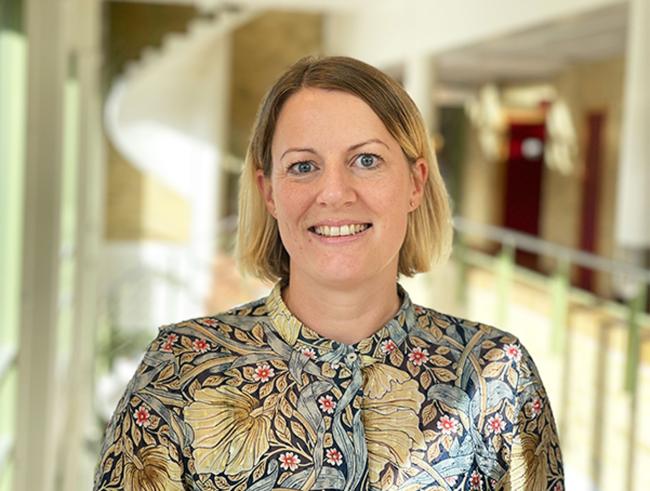Siri Jakobsson Störe receives national research award for groundbreaking sleep research
2025-11-13Siri Jakobsson Störe has been awarded the Swedish National Committee for Psychological Sciences’ prize for outstanding young researcher in psychology 2025. She receives the award for her research on insomnia and how sleep difficulties can be understood and treated.
– I’m very honoured, says Siri Jakobsson Störe, senior lecturer in psychology at Karlstad University. Being recognised in national competition, and in a context where universities nominate their most promising researchers, means a lot both personally and professionally. I’m also pleased to be representing Karlstad University in this forum for the first time.
Sleep research with societal impact
Siri Jakobsson Störe completed her PhD in 2024 at Karlstad University with her doctoral thesis “Lean, mean sleep machine? Effects and experiences of a sleep robot intervention for adults with insomnia”, where she explores the impact of a commercial sleep robot on the treatment of insomnia.
Her research focuses on psychological mechanisms behind sleep difficulties, particularly how hyperarousal and comorbidity with neuropsychiatric conditions such as ADHD affect sleep and the results of treatment. She is also exploring how technological aids like sleep robots can provide support to groups where conventional treatment falls short.
– Sleep difficulties are common and affect people’s health, quality of life and everyday living, says Siri Jakobsson Störe. My research aims to increase understanding of the psychological mechanisms that maintain insomnia and find new ways for treatment.
From clinical experience to research
Her interest in the research area developed from clinical experience in psychiatry.
– I have previously worked in child and adolescent psychiatry, where sleep difficulties are often a central and persistent part of the problems that affect the everyday life of the entire family. I noted that existing treatments didn’t always have a satisfactory effect. It sparked my curiosity about the underlying psychological mechanisms behind insomnia. Technology is not a substitute for treatment, but can be a support for increasing accessibility and individualised options – especially for groups where alternative solutions are limited.
She hopes that the research will contribute to more individualised and accessible treatment.
– If we have a better understanding of the processes that maintain insomnia across different groups, we can also develop more precise and accessible forms of treatment. In the long term, it can help reduce suffering and ease the strain on healthcare services
Prize that offers future opportunities
The prize recognises young promising researchers who have completed their PhD in recent years and aims to promote continued high-quality research in psychology. The award ceremony will take place in connection with a symposium that Siri Jakobsson Störe has been given the opportunity to organise together with the Swedish National Committee for Psychological Sciences and the Royal Swedish Academy of Sciences next year.
– It will be an opportunity to bring together researchers and professionals to discuss future work on sleep and health, says Siri Jakobsson Störe. A valuable opportunity to highlight this area of research and make new contacts.
The jury’s statement
In the statement, the jury emphasises Siri Jakobsson Störe’s pioneering research on insomnia, her methodological breadth and her ability to integrate psychological theory with clinical practice and technology-based solutions. Her research is considered to have significant potential to influence both future research studies and clinical practice, particularly in areas where conventional treatments are inadequate or inaccessible. Her doctoral thesis is exceptionally well written and presented in a way that engages a wider audience, and since completing her PhD, Siri Jakobsson Störe has demonstrated a strong commitment to academia and continued to establish an independent research track.
- Link to the doctoral thesis: Lean, mean sleep machine?: Effects and experiences of a sleep robot intervention for adults with insomnia


